Brighton and Hove students secure transportation wins
Brighton and Hove students secure transportation wins for more accessible, reliable and affordable commutes
By Sachin Bhopal-Myers, Paris Palmano, & Martha Rayner
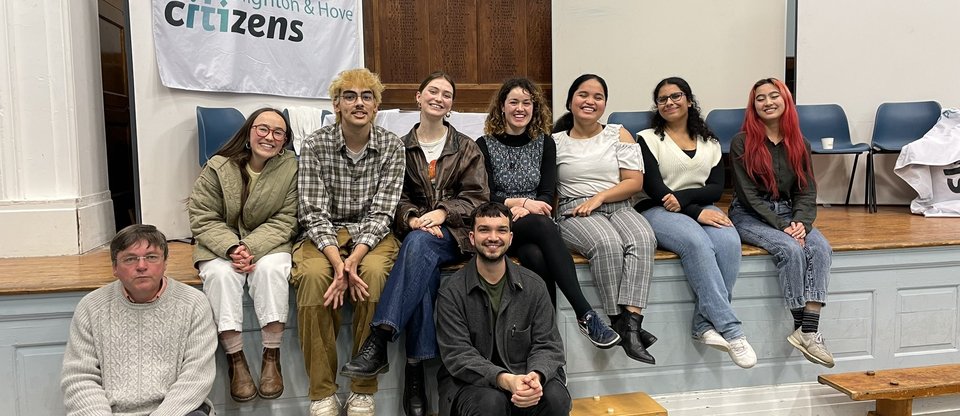
This story is an extract from 'Hungry For Change', a new book featuring case studies from schools' organising across Citizens UK. Edited by Dr Sebastien Chapleau. Download the full, free e-book and other publications here.
Expensive bus fares and unreliable routes. These were just some of the issues that Brighton & Hove students faced on their journeys to and from college. In 2020, a group of students initially organised a rally outside Brighton train station to protest the fact that students in full-time education needed to start paying adult fares when they turned 18, often in the months or weeks leading up to their A-Level exams.
Much to their dismay, the campaign ultimately lost momentum as they hadn’t yet built relational power, were using the wrong tactics, and even had the wrong target. The students teamed up with their local Organiser and learned about Community Organising, placing this learning into practice to win the change they wanted to see.
Listening became their superpower. House Meetings, a cornerstone of their strategy, revealed the tales of unreliability, affordability and discriminatory bus drivers, faced by students commuting to school and college. The campaign evolved, uncovering passenger safety concerns through real-life stories shared during meetings at BHASVIC, a large college in the heart of Brighton and Hove.
The campaign research team focusing on affordability looked into the Unizone discount scheme, set out by Southern Rail to offer train discounts to University and College students. Through the research, it was found that approximately 30% of students attending college in Brighton & Hove were not able to access the scheme, representing a barrier to education.
The team also learned that for deprived communities across the city, bus travel was incredibly unaffordable. Despite a £2 fare initiative funded by the Government, residents were having to turn down heavy tins at food banks because they couldn’t afford the bus to take them home and couldn’t carry them without it. Many families across the city were struggling to pay for the bus that takes their children to school.
The research team focusing on reliability found that there were specific areas where there were bus services that were not meeting demand. Every School, College and University in the alliance were underserved by the Bus Company. It was found that students from BACA, a school next to Sussex University, were having significant issues with public transport. Some students were arriving as early as 7am to ensure they would be able to get to school on time. Many school students would wait at the bus stop after school till as late as 7pm as the buses would be full of University students and would drive past the school without stopping.
Furthermore, BACA students from Whitehawk, an area on the periphery of the city, were put at further disadvantage, as there isn’t a direct bus to school, and despite their school being close ‘as the crow flies’, the bus route was incredibly long and required changes. The research highlighted that specific areas of Brighton, in particular Whitehawk, were being put at significant disadvantage, resulting in barriers to social mobility and access to education.
In summary, the listening process established clear areas of concern, which then turned the wider problems into specific proposals around timetabling, discount schemes and training which would later be presented to key stakeholders and decision-makers. A notable element of the campaign was the use of social media to promote the campaign’s visibility. The use of TikTok under the account @southernfail was a huge success, as it not only went ‘viral’ and helped gather more stories but led to engagement from the Deputy Leader of the Council.
What action was taken?
To get elected officials and representatives of the major transport companies to deliver on improving transport in the city, a Citizens Assembly was held at Varndean College to create a sense of accountability when asking them to commit to key promises. The proposals were voiced in front of an audience made up of our community members, representing 20 institutions and over 55,000 people.
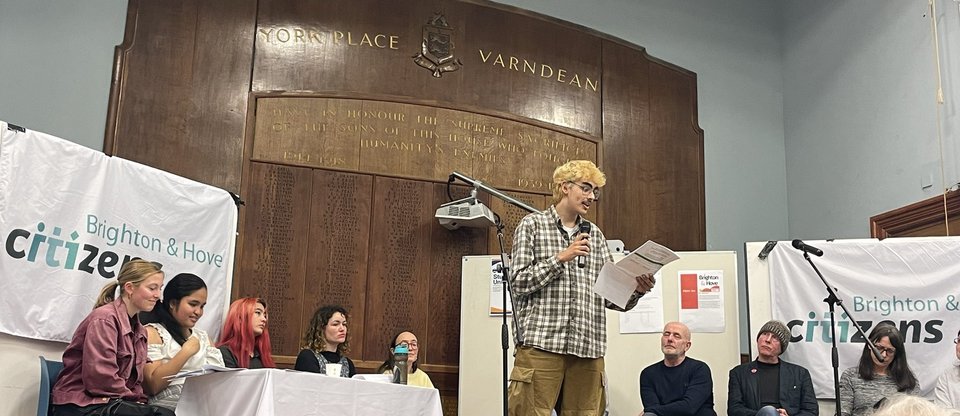
The testimony on reliability was coupled with a visual display of students queuing by the ‘bus stop’ whilst a sign saying ‘bus full’ went past them. More students joined in as time went on to show the audience and the guests how chaotic and difficult the journey to school can be for students. It was important to show that whilst for some people this might just be a low-level inconvenience, the unreliability of buses had become routine and affected our daily lives.
The goal of the Assembly was to get the Council and the companies to recognise that transport issues are having a significant impact on the wellbeing, opportunities and access to education of many across the city. Brighton & Hove Citizens secured the Councils commitment to work with them on the issues in all three areas. They negotiated with the Council to ensure that the cost of public transport is not a barrier to education, employment, or social inclusion for young people, marginalised people and the poorest in our city.
In practical terms they have agreed to build a plan to ensure that unaccompanied under 19-year-olds can travel on the bus free of charge anytime with the use of ID or a school uniform. They have also successfully managed to put this into Labour’s election manifesto.
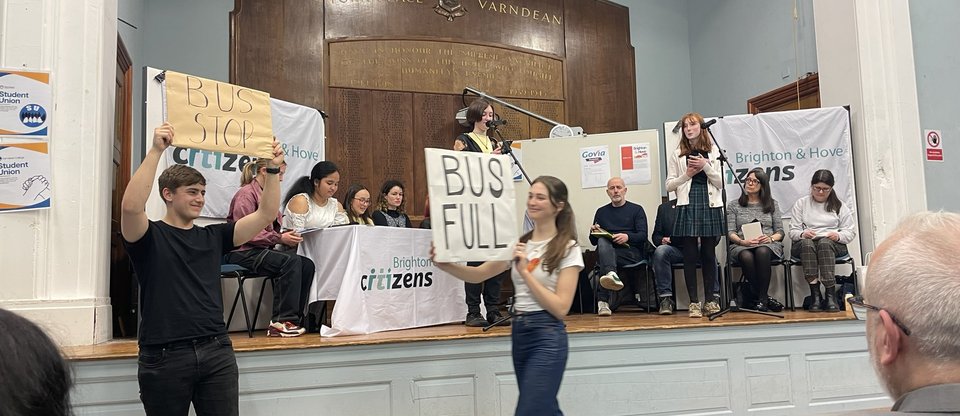
The Transport Assembly was the first Brighton and Hove citizens assembly to be organised by young people. The action team is formed by a diverse group of people; transport is a huge concern for young people and economically deprived adults in the city. Three powerful testimonies were held to voice this.
Sachin, a BHASVIC student, spoke about his experience with discriminatory bus drivers, highlighting the need for passengers' safety to be valued through better training for staff and eliminating the bystander effect so passengers can speak up safely for what they know is right.
Steven, a volunteer at Whitehawk food bank, highlighted the experience of many people, including himself, struggling to afford the bus fares. Steven described the full extent of this impact:
“I care about my community, and I feel like our needs aren’t being considered […] I have to deal with the consequences of missing my appointments, my community members have to deal with the consequences of missing the foodbank and we all deal with the feelings of isolation.”
A testimony was given on reliability from BACA secondary students, Leonie and Izzy, about the bus driving past them.
“Sometimes I have to wait at the bus stop for an hour and a half while full buses drive past. It is so frustrating and it happens at least twice a week. On those days I miss out on having dinner with my family and I have to eat alone later […] I have to choose between having dinner with my family and doing things that I really enjoy.”
The Assembly also got key decision makers to agree to recognise that many residents in peripheral parts of the city can’t afford public transport and commit to explore how to make it more manageable for them. This element is progressing well, with discussions for a £1 or free bus fare for short hops in specific underserved neighbourhoods in the city.
In terms of bus reliability, companies and the Council are now working with local education leaders to review bus timetables to better meet the needs of young people as they travel to and from School, College, and University. Negotiations are taking place with the train company about safety on their network and will continue to engage with the bus company, who are now keen to work to improve this.
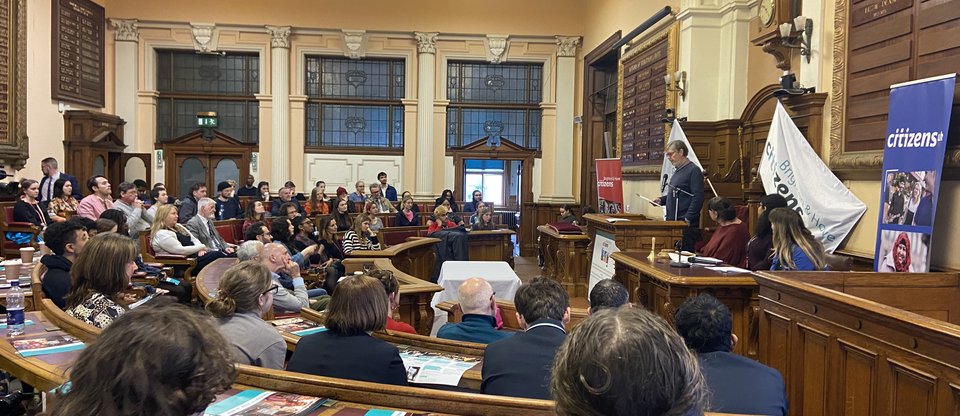
There are some early wins being seen regarding train affordability. Only a limited number of Universities and Colleges in the city are included in the discount scheme though this has been successfully negotiated for every further and higher education institution to be included, if they meet certain criteria. Varndean College has updated its Student ID and is now being included on the list on the scheme's website. This will mean its students can access the discount without spending £20 each on a NUS/TOTUM card to do so.
This was identified as a significant barrier to the scheme’s uptake in the listening process. Approximately one thousand students could benefit as they live inside the scheme’s zone. Depending on where students are travelling to Varndean College from, they could save between £20 and £200 a year. Altogether, that’s tens of thousands of pounds of savings!
In conclusion, the campaign has been successful so far but still requires further negotiation between our member institutions, the companies and the Council. One of the most helpful things that helped us progress was the Citizens UK Climate Justice National Training that was taking place alongside the campaign. A number of our team members were on that training and that meant we had fortnightly deadlines to progress to the next stage of the campaign as we went. This allowed us to carry the campaign forward quickly and effectively and built in planning time. We will take this approach forward into our future campaigns.
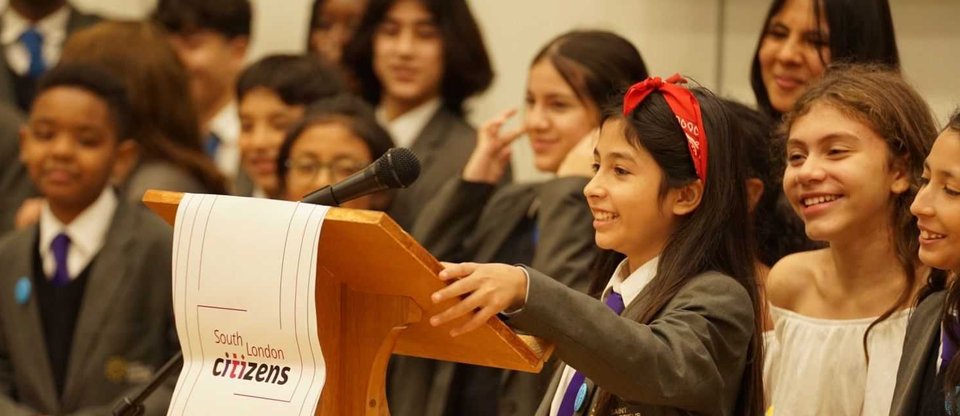
Many schools (primary, secondary, and sixth form colleges) choose to become members of Citizens UK to build a better, fairer society.
We work together to make change on the issues that matter, from campaigning for zebra crossings on dangerous roads, to reforming the immigration system, to the Living Wage campaign.
Using Community Organising, students, teachers and parents can work together to drive community-led solutions to big and small problems, that work for everyone.
Find out more about how your school can become a Citizens UK member.




